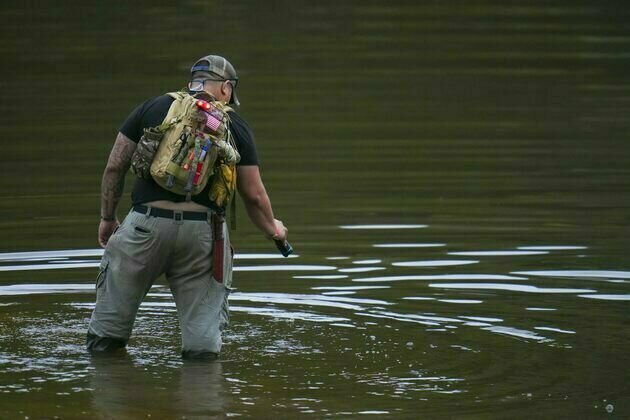In Texas, parents search flood debris for missing kids. Are Australians ready for our own sudden floods?
The Conversation
07 Jul 2025, 04:40 GMT+10

Harrowing stories are emerging in the wake of catastrophic and sudden flooding over the fourth of July weekend in Texas - where many people were camping, and children were at riverside summer camp.
More than 80 people are confirmed dead (28 of whom were children) and 12 people are still missing. Parents have described finding children's bodies while picking through flood debris searching for their own missing kids.
In Texas, the floodwaters rose very rapidly and in the middle of the night. Authorities had issued flood warnings but many people were still caught off-guard.
Sudden floods can also happen in Australia, as seen recently in New South Wales around Taree and Lismore, in the wake of ex-Cyclone Alfred.
As climate change makes severe weather events more frequent, it's worth asking: how ready is Australia for its next sudden flood? And what could help to encourage people to leave while there's still time?
Decades of research shows disasters can emerge and change very quickly. Hazards at night are especially difficult, because much can change while people are sleeping.
Even when flood warnings are issued, authorities can struggle to convince people the problem will affect them.
People often base their risk assessments on what's happened in the past. So, if they live in an area that has experienced minor flooding before, they may think the current flood will be similarly minor.
Research also shows people often wait for extra evidence to confirm the initial warnings from officials. They might look to see if people around them are preparing to leave, or look for cues from the environment such as a sudden burst of loud rain.
Unfortunately, waiting can mean you miss the opportunity to leave. A road may close, or services may be overwhelmed and evacuation may no longer be an option. Escape options can narrow incredibly quickly, especially when people are asleep.
The Albanese government announced in 2023 it would spend A$236 million over a decade to establish a national flood warning network. This will involve buying and upgrading flood gauges across Australia and trying to repair what the government has called "patchwork flood gauge network".
That's important, and it's also positive to see other research on ways we can use existing technology infrastructure such as mobile phone towers to get early warnings on rising floodwaters.
But technology is only one part of the bigger picture. As growing body of research shows, many people do not evacuate even when warned about floods or fire.
Authorities must find ways to communicate disaster risk in a way that people will respond to.
Research shows getting the message out through as many channels as possible is crucial. People need to hear about the warnings on TV and on radio and online through various platforms and via local groups as well as national authorities.
The evidence also suggests people are more likely to trust messages coming from others in their community.
So, emergency agencies should work through community "champions" to help spread the word about an impending flood threat. It could be the principal of a school, a trusted source in a non-English speaking community, local emergency services volunteers or the manager of a local neighbourhood centre.
Emergency and government agencies need to identify trusted sources in communities, and build connections with them, before the crisis arrives to ensure information is disseminated smoothly in an emergency.
Many people hear warnings and believe a flood is coming, but may think the worst impacts won't happen in their area. This is a very common misconception.
That's why information should be tailored so people understand the risk at their particular location.
Helping people understand the consequences of not evacuating is also vital. This might mean messaging such as "if you don't leave now, the floods will be over your roof and we may not be able to come and rescue you or your children or pet".
Residents may not understand how fast floodwaters can move, that conditions may be very choppy and windy, or that large and dangerous debris will be coming at them and their children in a flood. This should also be communicated clearly.
Education prior to the crisis event can help people understand what flood waters can do at their location. This community awareness should be conducted in flood-prone areas at regular intervals.
Localised, tailored information can help people understand what will happen to them and their families if they don't leave early enough - hopefully preventing devastating death tolls of the kind Texas is now grappling with.
 Share
Share
 Tweet
Tweet
 Share
Share
 Flip
Flip
 Email
Email
Watch latest videos
Subscribe and Follow
Get a daily dose of Sydney Sun news through our daily email, its complimentary and keeps you fully up to date with world and business news as well.
News RELEASES
Publish news of your business, community or sports group, personnel appointments, major event and more by submitting a news release to Sydney Sun.
More InformationBusiness
SectionRussia among 4 systemic risk countries for Italian banks
MILAN, Italy: Italian regulators have flagged four non-EU countries—including Russia—as carrying systemic financial risk for domestic...
US debt limit raised, but spending bill fuels fiscal concerns
NEW YORK CITY, New York: With just weeks to spare before a potential government default, U.S. lawmakers passed a sweeping tax and spending...
Shein hit with 40 million euro fine in France over deceptive discounts
PARIS, France: Fast-fashion giant Shein has been fined 40 million euros by France's antitrust authority over deceptive discount practices...
Meta hires SSI CEO Gross as AI race intensifies among tech giants
PALO ALTO/TEL AVIV: The battle for top AI talent has claimed another high-profile casualty—this time at Safe Superintelligence (SSI),...
Engine defect prompts Nissan to recall over 443,000 vehicles
FRANKLIN, Tennessee: Hundreds of thousands of Nissan and Infiniti vehicles are being recalled across the United States due to a potential...
Microsoft trims jobs to manage soaring AI infrastructure costs
REDMOND, Washington: Microsoft is the latest tech giant to announce significant job cuts, as the financial strain of building next-generation...
International
SectionWeapons pause by Trump signals shift away from foreign wars
WASHINGTON, D.C.: President Donald Trump is drawing praise from his core supporters after halting key arms shipments to Ukraine, a...
Moscow removes Taliban from banned list, grants official status
MOSCOW, Russia: This week, Russia became the first country to officially recognize the Taliban as the government of Afghanistan since...
Netanyahu vows 'No Hamas' in postwar Gaza amid peace talks
CAIRO, Egypt: This week, both Hamas and Israel shared their views ahead of expected peace talks about a new U.S.-backed ceasefire plan....
US sends message by publicizing visa ban on UK punk-rap band
WASHINGTON, D.C.: The Trump administration has made public a visa decision that would usually be kept private. It did this to send...
Tragedy in Spain: Diogo Jota and his brother die in car accident
MADRID, Spain: Liverpool footballer Diogo Jota and his younger brother, André Silva, have died in a car accident in Spain. Spanish...
Early heatwave grips Europe, leaving 8 dead and nations on alert
LONDON, U.K.: An unrelenting heatwave sweeping across Europe has pushed early summer temperatures to historic highs, triggering deadly...













